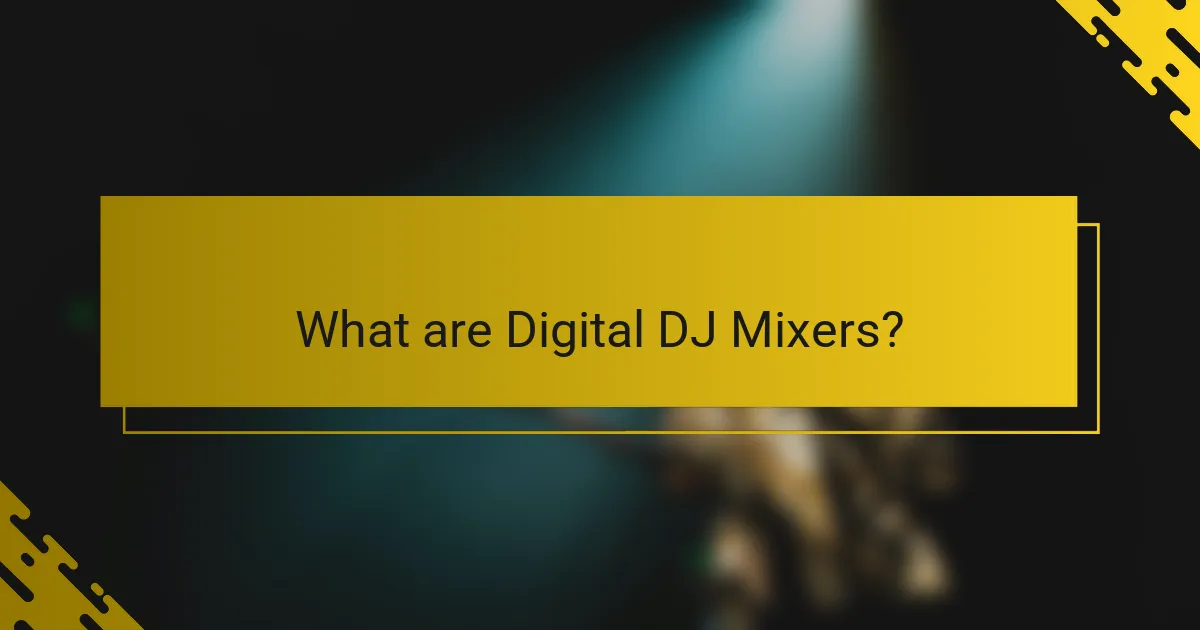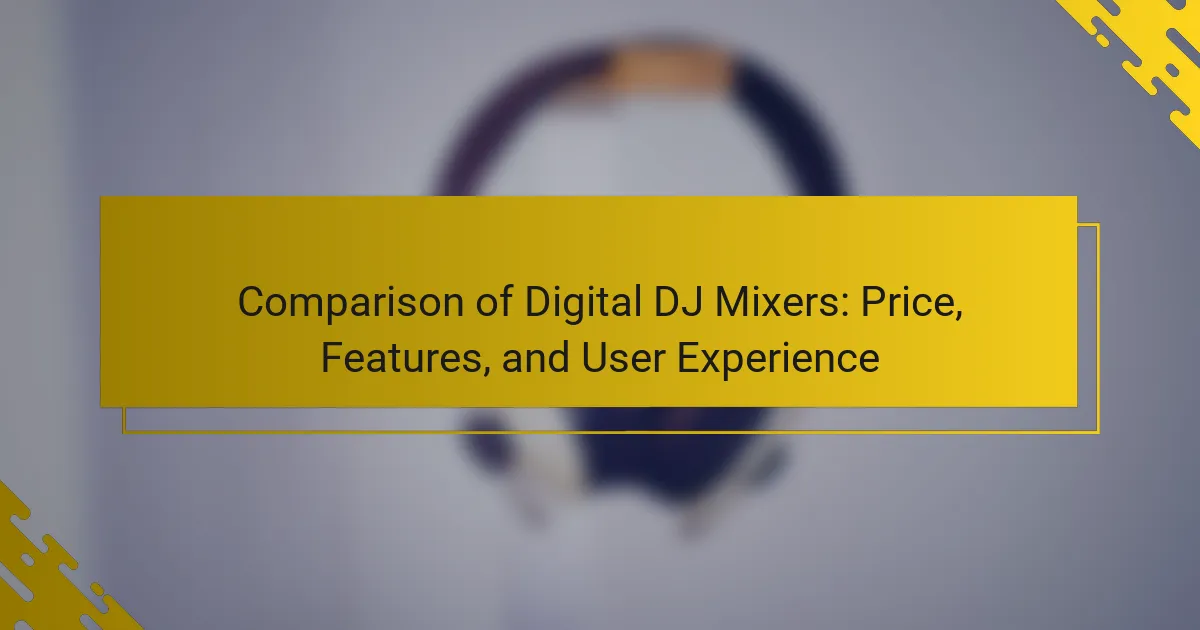Digital DJ mixers are electronic devices that enable DJs to blend and manipulate audio signals from various sources, including turntables, CD players, and digital files. This article provides a comparison of digital DJ mixers, focusing on their price, features, and user experience. Key aspects covered include the functionality of controls such as EQ, effects, and faders, as well as the importance of built-in sound cards and USB connectivity for integration with DJ software. Popular models from brands like Pioneer and Numark are also examined to highlight their role as essential tools in modern music performance.

What are Digital DJ Mixers?
Digital DJ mixers are electronic devices used by DJs to blend and manipulate audio signals. They allow for the mixing of multiple audio sources, such as turntables, CD players, and digital audio files. Digital DJ mixers typically feature various controls, including EQ, effects, and faders. These mixers enable DJs to create seamless transitions between tracks. Many digital DJ mixers also include built-in sound cards for audio output. They often support USB connectivity for integrating with DJ software. Popular models include those from brands like Pioneer and Numark. Digital DJ mixers have become essential tools in modern music performance.
How do Digital DJ Mixers differ from traditional mixers?
Digital DJ mixers incorporate digital technology, while traditional mixers use analog circuitry. Digital mixers often feature built-in effects, sampling capabilities, and software integration. Traditional mixers typically rely on physical connections and manual adjustments. Digital mixers provide enhanced flexibility with programmable settings and presets. Traditional mixers may offer a more tactile experience with physical knobs and faders. Digital DJ mixers can connect to computers and software for advanced audio manipulation. Traditional mixers are often simpler, focusing on basic mixing functions. These differences affect user experience and performance capabilities in live settings.
What are the key components of a Digital DJ Mixer?
The key components of a Digital DJ Mixer include input channels, output channels, EQ controls, and effects processors. Input channels allow the connection of various audio sources. Output channels direct the mixed audio to speakers or recording devices. EQ controls adjust the frequency levels of the audio. Effects processors add sound effects such as reverb or delay. Additionally, a digital DJ mixer typically features a built-in sound card for audio interface capabilities. These components work together to facilitate live mixing and enhance the DJ performance experience.
How does the technology in Digital DJ Mixers enhance performance?
Digital DJ mixers enhance performance through advanced technology features. These mixers often include built-in effects, allowing DJs to manipulate sound in real-time. High-quality audio processing ensures clarity and depth in music playback. Many models offer intuitive touchscreens for easy navigation and control. Connectivity options, such as USB and Bluetooth, enable seamless integration with various devices. Additionally, features like automatic beat matching improve mixing accuracy. Some mixers incorporate MIDI control, expanding creative possibilities. These technological advancements collectively elevate the overall DJing experience.
What are the main features of Digital DJ Mixers?
Digital DJ mixers typically feature multiple channels for audio input. These channels allow DJs to mix different audio sources simultaneously. They often include built-in effects such as reverb and echo. This enhances the overall sound quality and creativity in performances. Many digital DJ mixers come with a digital audio interface. This enables direct connection to computers and software for seamless integration. Additionally, they often have MIDI compatibility for controlling DJ software. Some models include touchscreen displays for intuitive navigation. Finally, many digital mixers feature USB connectivity for easy file transfer and recording.
What types of connectivity options do Digital DJ Mixers offer?
Digital DJ mixers offer various connectivity options, enhancing their versatility. Common types include USB connections for direct computer integration. Many mixers also feature RCA inputs for connecting external devices like CD players. XLR outputs are standard for connecting to professional sound systems. Additionally, some mixers provide MIDI connectivity for controlling software and hardware. Wireless connectivity options, such as Bluetooth, are increasingly available for mobile devices. These connectivity features ensure compatibility with different audio sources and setups.
How do effects and sound processing capabilities vary among models?
Effects and sound processing capabilities vary significantly among digital DJ mixer models. Higher-end models often include advanced effects like reverb, echo, and filters. These mixers may also offer multiple sound processing options, such as EQ adjustments and dynamic range compression. Entry-level models typically have fewer effects and basic processing capabilities. For instance, some budget mixers might only provide basic equalization and limited effects. The number of simultaneous effects can also differ; premium mixers may allow layering multiple effects at once. Additionally, some models feature customizable effects parameters, enhancing creative control. Manufacturers often specify these capabilities in product specifications, allowing users to compare options effectively.
What factors influence the price of Digital DJ Mixers?
The price of Digital DJ Mixers is influenced by several key factors. Brand reputation plays a significant role, as established brands often command higher prices. The number of channels available in a mixer affects its cost; more channels typically mean a higher price. Additionally, the presence of advanced features, such as built-in effects and connectivity options, can increase the price. Build quality and materials used also contribute to cost; higher quality materials often result in higher prices. Finally, the inclusion of software or additional accessories can impact the overall pricing of Digital DJ Mixers.
How do brand reputation and product quality affect pricing?
Brand reputation and product quality significantly influence pricing strategies. A strong brand reputation often allows companies to charge premium prices. This is because consumers associate reputable brands with reliability and superior performance. For example, brands like Pioneer and Denon are known for high-quality digital DJ mixers. Their established reputation justifies higher price points compared to lesser-known brands.
Product quality directly impacts pricing as well. Higher quality products typically require better materials and advanced technology. This increases production costs, which are reflected in retail prices. Research shows that consumers are willing to pay more for products perceived as high quality. According to a study by Nielsen, 59% of consumers prefer to buy new products from brands familiar to them. This indicates that brand reputation and perceived quality are key factors in consumer purchasing decisions.
What is the impact of features on the cost of Digital DJ Mixers?
The impact of features on the cost of digital DJ mixers is significant. More advanced features increase the overall price. High-quality audio processing capabilities, built-in effects, and multiple input options raise manufacturing costs. Additionally, mixers with touchscreen interfaces or extensive connectivity options tend to be more expensive. Research indicates that models with more features can cost up to 50% more than basic versions. Thus, the correlation between features and cost is clear in the digital DJ mixer market.
How do users experience Digital DJ Mixers?
Users experience Digital DJ Mixers as intuitive tools for music mixing. They appreciate the user-friendly interfaces that allow for seamless navigation. Many users highlight the responsiveness of the controls, which enhances their performance. The integration of software features like effects and loops is often praised. Users report increased creativity due to the extensive customization options available. The portability of digital mixers is also a significant advantage for mobile DJs. Feedback often emphasizes the sound quality, which is typically superior to analog mixers. Overall, users find digital DJ mixers to be essential for modern music performance.
What do user reviews typically highlight about performance and usability?
User reviews typically highlight speed and responsiveness as key aspects of performance and usability. Many users appreciate mixers that allow for quick adjustments during live sets. They often mention the importance of intuitive interfaces and layout for ease of use. Reviewers frequently note that seamless integration with software enhances overall performance. Additionally, sound quality is a common point of praise or criticism. Users also emphasize the importance of reliable connectivity options for devices. Feedback often includes comments on the durability of controls and build quality. Overall, user reviews reflect a strong correlation between performance metrics and user satisfaction.
How does the user interface design affect the overall experience?
User interface design significantly impacts overall user experience. A well-designed interface enhances usability and accessibility. It facilitates intuitive navigation and reduces the learning curve for users. Effective visual hierarchy guides users’ attention to key features. Consistent design elements foster familiarity and comfort. Research shows that 94% of first impressions are design-related. This highlights the importance of aesthetics in user engagement. A positive user interface leads to increased satisfaction and prolonged usage.
What are the best practices for choosing a Digital DJ Mixer?
Determine your budget before selecting a Digital DJ Mixer. Popular models range from $200 to $2,000. Evaluate essential features such as the number of channels and effects. Consider mixers with at least four channels for versatility. Look for user-friendly interfaces to enhance your mixing experience. Research brand reliability and customer reviews for informed decisions. Test the mixer in-store if possible to assess build quality and feel. Ensure compatibility with your existing equipment and software. These practices lead to a suitable choice for your needs.
How can users determine which features are most important for their needs?
Users can determine which features are most important for their needs by assessing their specific requirements and preferences. They should start by identifying the primary purpose of the digital DJ mixer. For instance, some users may prioritize portability for mobile DJing, while others may focus on advanced effects for studio mixing.
Next, users can create a list of must-have features based on their intended use. This may include the number of channels, built-in effects, and connectivity options. Users should also consider their skill level. Beginners may need simpler interfaces, while professionals might seek advanced functionalities.
Comparing different models and reading user reviews can provide insights into the performance and reliability of specific features. Users can also consult expert reviews and comparisons to understand the pros and cons of various mixers.
Finally, hands-on testing at a music store can help users experience the feel and functionality of mixers before making a decision. This approach ensures that users select a mixer that aligns with their unique needs and preferences.
What tips can help users make informed purchasing decisions?
Research product specifications. Compare features like sound quality and connectivity options. Read user reviews for real-world insights. Check warranty and return policies for buyer protection. Consider brand reputation for reliability. Assess your budget to avoid overspending. Look for expert reviews from trusted sources. Test products in-store when possible for hands-on experience.
Digital DJ mixers are electronic devices used by DJs to blend and manipulate audio signals, featuring various controls for seamless track transitions. This article provides a comprehensive comparison of digital DJ mixers, focusing on their price, features, and user experience. Key topics include the differences between digital and traditional mixers, essential components, connectivity options, and how technological advancements enhance performance. Additionally, it explores factors influencing pricing, user feedback on performance and usability, and best practices for selecting the right mixer based on individual needs.
